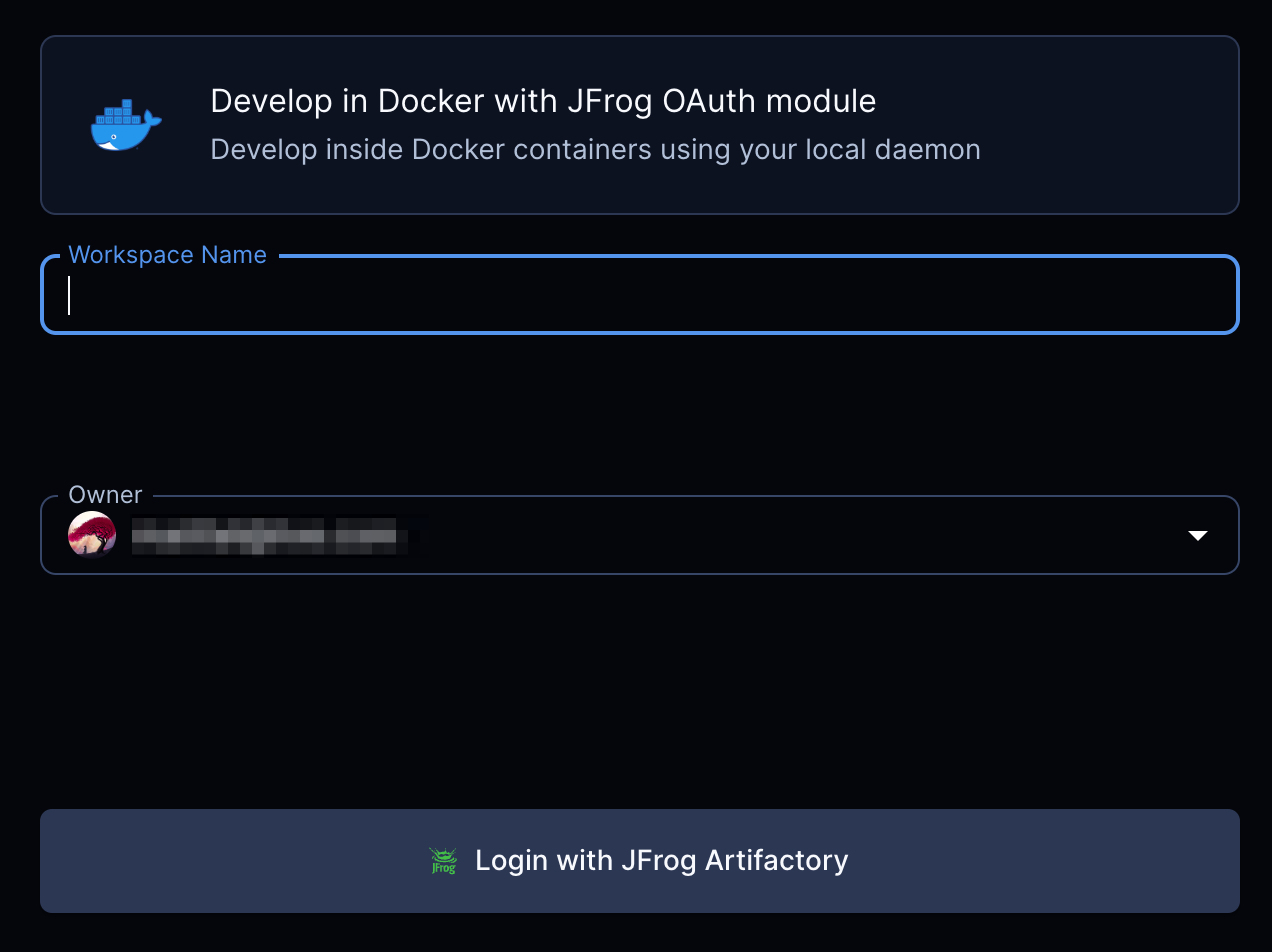|
|
2 years ago | |
|---|---|---|
| .. | ||
| README.md | 2 years ago | |
| main.test.ts | 2 years ago | |
| main.tf | 2 years ago | |
| run.sh | 2 years ago | |
README.md
| display_name | description | icon | maintainer_github | partner_github | verified | tags | ||
|---|---|---|---|---|---|---|---|---|
| JFrog (OAuth) | Install the JF CLI and authenticate with Artifactory using OAuth. | ../.icons/jfrog.svg | coder | jfrog | true |
|
JFrog
Install the JF CLI and authenticate package managers with Artifactory using OAuth configured via the Coder external-auth feature.

module "jfrog" {
source = "registry.coder.com/modules/jfrog-oauth/coder"
version = "1.0.0"
agent_id = coder_agent.example.id
jfrog_url = "https://jfrog.example.com"
username_field = "username" # If you are using GitHub to login to both Coder and Artifactory, use username_field = "username"
package_managers = {
"npm": "npm",
"go": "go",
"pypi": "pypi"
}
}
Note This module does not install
npm,go,pip, etc but only configure them. You need to handle the installation of these tools yourself.
Prerequisites
Coder external-auth configured with Artifactory. This requires a custom integration in Artifactory with Callback URL set to https://<your-coder-url>/external-auth/jfrog/callback.
To set this up,
- Modify your
values.yamlfor JFrog Artifactory to add,
artifactory:
enabled: true
frontend:
extraEnvironmentVariables:
- name: JF_FRONTEND_FEATURETOGGLER_ACCESSINTEGRATION
value: "true"
access:
accessConfig:
integrations-enabled: true
integration-templates:
- id: "1"
name: "CODER"
redirect-uri: "https://CODER_URL/external-auth/jfrog/callback"
scope: "applied-permissions/user"
Note Replace
CODER_URLwith your Coder deployment URL, e.g., <coder.example.com>
- Add a new external authetication to Coder by setting these env variables,
# JFrog Artifactory External Auth
CODER_EXTERNAL_AUTH_1_ID="jfrog"
CODER_EXTERNAL_AUTH_1_TYPE="jfrog"
CODER_EXTERNAL_AUTH_1_CLIENT_ID="YYYYYYYYYYYYYYY"
CODER_EXTERNAL_AUTH_1_CLIENT_SECRET="XXXXXXXXXXXXXXXXXXX"
CODER_EXTERNAL_AUTH_1_DISPLAY_NAME="JFrog Artifactory"
CODER_EXTERNAL_AUTH_1_DISPLAY_ICON="/icon/jfrog.svg"
CODER_EXTERNAL_AUTH_1_AUTH_URL="https://JFROG_URL/ui/authorization"
CODER_EXTERNAL_AUTH_1_TOKEN_URL="https://JFROG_URL/access/api/v1/integrations/YYYYYYYYYYYYYYY/token"
CODER_EXTERNAL_AUTH_1_SCOPES="applied-permissions/user"
Note Replace
JFROG_URLwith your JFrog Artifactory base URL, e.g., <artifactory.example.com>
Examples
Configure the Python pip package manager to fetch packages from Artifactory while mapping the Coder email to the Artifactory username.
module "jfrog" {
source = "registry.coder.com/modules/jfrog-oauth/coder"
version = "1.0.0"
agent_id = coder_agent.example.id
jfrog_url = "https://jfrog.example.com"
auth_method = "oauth"
username_field = "email"
package_managers = {
"pypi": "pypi"
}
}
You should now be able to install packages from Artifactory using both the jf pip and pip command.
jf pip install requests
pip install requests
Configure code-server with JFrog extension
The JFrog extension for VS Code allows you to interact with Artifactory from within the IDE.
module "jfrog" {
source = "registry.coder.com/modules/jfrog-oauth/coder"
version = "1.0.0"
agent_id = coder_agent.example.id
jfrog_url = "https://jfrog.example.com"
username_field = "username" # If you are using GitHub to login to both Coder and Artifactory, use username_field = "username"
configure_code_server = true # Add JFrog extension configuration for code-server
package_managers = {
"npm": "npm",
"go": "go",
"pypi": "pypi"
}
}
Using the access token in other terraform resources
JFrog Access token is also available as a terraform output. You can use it in other terraform resources. For example, you can use it to configure an Artifactory docker registry with the docker terraform provider.
provider "docker" {
...
registry_auth {
address = "https://YYYY.jfrog.io/artifactory/api/docker/REPO-KEY"
username = module.jfrog.username
password = module.jfrog.access_token
}
}